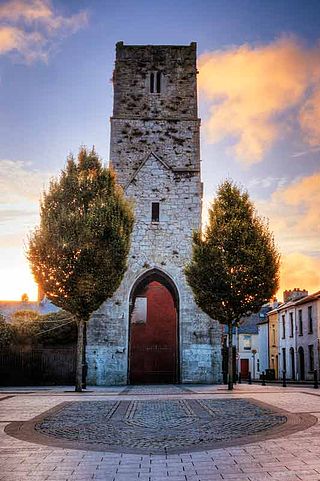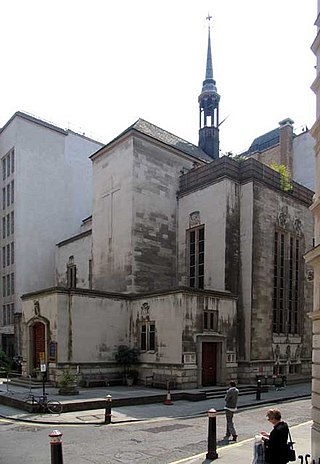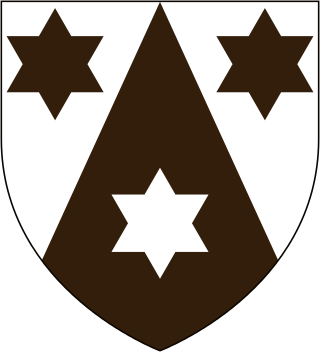Related Research Articles

The Red Abbey in Cork, Ireland was a 14th-century Augustinian abbey which took its name from the reddish sandstone used in construction. Today all that remains of the structure is the central bell tower of the abbey church, which is one of the last remaining visible structures dating to the medieval walled town of Cork.

The Crutched Friars were a Roman Catholic religious order in England and Ireland. Their name is derived from a staff they carried with them surmounted by a crucifix. There were several orders devoted to the Holy Cross, collectively known as Crosiers, that had some presence in England and there is much confusion to which specific order the friars belonged. Earlier literature linked most of the Crutched Friars to the Italian Crosiers, but later it was proven that they were a branch of the Belgian Canons Regular of the Order of the Holy Cross. The Crutched Friars were suppressed during the Dissolution of the Monasteries in 1538.

Blackfriars, Gloucester, England, founded about 1239, is one of the most complete surviving Dominican black friaries in England. Now owned by English Heritage and restored in 1960, it is currently leased to Gloucester City Council and used for weddings, concerts, exhibitions, guided tours, filming, educational events and private hires. The former church, since converted into a house, is a Grade I listed building.
Events from the year 1537 in Ireland.

The Dutch Church, Austin Friars, is a reformed church in the Broad Street Ward, in the City of London. Located on the site of the 13th-century Augustinian friary, the original building granted to Protestant refugees for their church services in 1550 was destroyed during the London Blitz.
William Mayhew was a British politician.
Donnington Friary was a friary of crouched friars at Donnington in the English county of Berkshire. At the time of suppression the establishment was recorded as Trinitarian, but this was later corrected to Crossed Friars. This was possibly a ploy by the two brothers in occupation at the time in order to ensure their pension.
Austin Friary was an Augustinian friary in Bristol, England. It was established in 1313, when Simon de Montecute gave 100 square feet (9.3 m2) of land within the Temple Gate of Bristol. Further gifts of land were made by William de Montecute and Thomas of Berkeley during the next thirty years.
Barham Friary was a Crutched Friars friary in Linton, Cambridgeshire, England. It was established around 1272 and was dissolved in 1538.
Colchester Greyfriars, otherwise the Franciscan Friary, Colchester, was a Franciscan friary in Colchester, Essex, England, situated to the north of the town's east gate. It was founded sometime before 1237. In 1309 the friars received a grant of half an acre of land from Robert Fitzwalter, Lord Fitzwalter, on which he built their church. According to John Weever, the antiquarian, in his Ancient Funerall Monuments, Fitzwalter became a friar here himself in 1325, and was buried here.
Wotton under Edge Friary was a friary of the Crutched Friars in Wotton-under-Edge, Gloucestershire, England.

Whitefriars, also known as the White Friars or The College of Carmelites, Gloucester, England, was a Carmelite friary of which nothing now survives.
Lossenham Friary was a Carmelite friary in Newenden in the Weald of Kent, England.

Burnham Norton Friary was a Carmelite friary near Burnham Market in Norfolk, England. It is now a ruin.
Guildford Friary was a medieval monastic house in Guildford, Surrey, England. It was founded c. 1275 by Eleanor of Provence, wife of Henry III and occupied a site of around 10 acres (4.0 ha) on the east side of the River Wey. It was dissolved in 1537.
Salisbury Black Friary was a friary in Wiltshire, England, in existence from 1281 to 1538.
Salisbury Grey Friary was a friary in Wiltshire, England between the 1230s and 1538.

The Black Friar is a Grade II* listed public house on Queen Victoria Street in Blackfriars, London.
References
- ↑ "Colchester Friary of Crutched Friars". Heritage Gateway. Retrieved 9 June 2024.